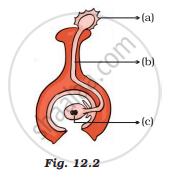Advertisements
Advertisements
प्रश्न
..................... type of reproduction occurs in Hydra.
(a) Binary fission
(b) Multiple fission
(c) Budding
(d) Fragmentation
_________________ type of reproduction takes place in Hydra.
(a) Budding
(b) Binary fission
(c) Multiple fission
(d) None of the above
उत्तर १
Budding type of reproduction occurs in Hydra
उत्तर २
Budding
Hydra uses regenerative cells for reproduction by budding.
APPEARS IN
संबंधित प्रश्न
Draw a labelled diagram to show that particular stage of binary fission in amoeba in which its nucleus elongates and divide into two and a constriction appears in its cell membrane.
How the process of regeneration in Planaria process different from reproduction?
External fertilisation takes place in frogs.
What happens when Bryophyllum leaf falls on the wet soil?
Name one organism which reproduces by spore formation
What is name of the organ of propagation present in a tuber?
Why do green grass plants spring up in dry fields on their own after the rains?
Name one unicellular organism which reproduces by the same asexual process as Hydra.
Describe the cuttings method for the artificial propagation of plants. Illustrate your answer with the help of labelled diagrams.
An organism which may be considered to be a kind of plant and reproduces by budding is :
(a) Paramecium
(b) Bread mould
(c) Hydra
(d) Yeast
Vegetative propagation refers to the formation of new plants from the following existing organs of the old plants :
(a) stems, roots and flowers
(b) stems, roots and leaves
(c) stems, flowers and fruits
(d) stems, leaves and flowers
The two organisms which can regenerate fully from their cut body parts are :
(a) Paramecium and Hydra
(b) Hydra and Amoeba
(c) Planaria and Leishmania
(d) Hydra and Planaria
A scientist removed some cells from the growing point of a plant and placed it in a suitable medium leading to the formation of a shapeless lump of mass X. X is then transferred to another medium which stimulates it to develop roots. When X with developed roots is placed in a yet another medium, then it develops shoots to form tiny plantlets. These plantlets can then be transplanted in pots or soil where they can grow to form mature plants.
(a) What is the shapeless lump of mass X known as?
(b) What name is given to this method of producing new plants?
(c) The growth medium used in this method contains plant nutrients in the form of a 'jelly'. Name this jelly.
(d) What is the general name of chemicals used to stimulate the growth of plant cells and development of roots and shoots?
(e) Name any two plants which are produced by this method.
(f) State any two advantages of this method of producing plants.
(g) What is the other name of this method [other then that given in (b) above]?
What is vegetative reproduction?
Write a short note on Bryophyllum.
With the help of suitable diagram, describe Budding in yeast cell.
Fill in the blank:
Fungi, ferns and mosses reproduce by ____________________.
State whether the following statement is true (T) or false (F):
A potato tuber is really an underground stem.
State whether the following statement is true (T) or false (F):
Cutting and grafting are natural means of reproduction.
Mention the common method of reproduction in Dahlia.
Mention the common method of reproduction in Potato.
Choose the correct statement(s) on budding in yeast from the following :
I. A parent cell divides into two or more daughter cells and here the parent identity is lost.
II. In this the elongated nucleus divides to form two or more daughter nuclei.
III. A bud arises from a particular region on a parent body.
IV. After detaching from the parent body the bud grows into a new independent individual.
(A) I only
(B) III only
(C) II and III only
(D) III and IV only
What is vegetative propagation? List with brief explanation three advantages of practising this process for growing some types of plants. Select two plants from the following which are grown by this process:
Banana, Wheat, Mustard, Jasmine, Gram.
Which of the following is a mode of asexual reproduction?
Write four lines on the following: Budding
Name the parts of the plants used to grow following flower: Dahlia
Name the parts of the plants used to grow following flower: Gladiolus
What are the objectives of plant hybridisation?
How is micropropagation carried out?
Grafting is not possible in the monocots because they
Name any one plant in which double fertilization was discovered?
Distinguish between sexual and asexual reproduction.
Spirogyra reproduce by ______
Which is the most common method of reproduction in the majority of fungi and bacteria?
Spirogyra reproduces by ______.
In Spirogyra, asexual reproduction takes place by
In the diagram given in Figure 12.2 label the parts marked (a), (b) and (c).

In an asexually reproducing species, if a trait X exists in 5% of a population and trait Y exists in 70% of the same population, which of the two trait is likely to have arisen earlier? Give reason.
The "Eyes" of the potato tuber are ______.
